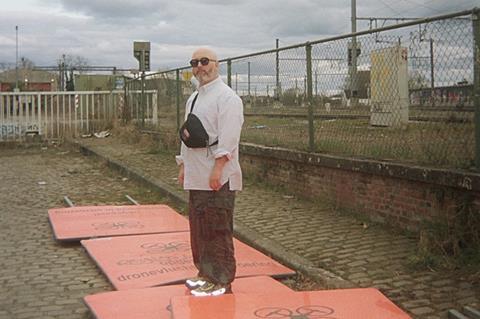
Filmmakers in Flanders have come to regard screenwriter Angelo Tijssens as a “magic bullet,” as he wryly puts it.
Films on whose scripts he has collaborated have won international recognition including the Camera d’Or for Lukas Dhont’s Girl and an Oscar nomination for Dhont’s Close. He also published as well-received novel called ‘The Edges’ earlier this year.
The Antwerp-based author, screenwriter and actor is in Ghent this week for the Flanders Film Days showcase where he has five new feature projects at different stages. The list includes Dhont’s First World War drama Coward, and Julian, the feature debut by Cato Kusters, which will open the 52nd Film Fest Gent following its Toronto premiere. Both titles are being sold by The Match Factory.
He has also written the scripts for Willy Vanderperre’s Othering, about young gay love; Anke Blondé’s psychological fraud drama, Dust, sold by LevelK, and Nathalie Teirlinck’s Jonah Was Here, about a grief-stricken father immersing himself in his son’s unfinished student life.
Tijssens was also recently elected president of the board of deAuteurs, the organisation representing the interests of Flemish writers, artists and filmmakers.
You seem remarkably prolific with five projects at FFD.
Of course, I can’t work on five projects at the same intensity, at the same time. Some of these were born almost a decade ago and I worked on them from the very start to feedback on the poster.
For some, I wrote a few drafts or the dialogue at some point.
Several of your projects at FFD are intense dramas dealing with grief and love. Is that coincidence?
A lot of the projects came to me. It’s not like I am this sad leech who’s waiting for grief so I can jump…but I think there is always this idea you’re not really part of the world you live in, that is something that connects all of my characters and stories.
Longing, love and grief are such primal emotions they very often show people as their true self. I also think as a society, we don’t know really know any more how to deal with fear, longing, death or grieving. In my work, and so in my life, I get to do that, with wonderful filmmakers. That’s a privilege.
You’re an exec producer on Anke Blondé’s Dust. Why were you keen to take that role?
It was natural. I wrote the film. I was there for the casting, the editing, the entire act of filmmaking , every step of the way.
What do you hope to achieve in your capacity as the new president of deAuteurs, fighting for artists’ rights?
I’m now in a part of my career when I can afford to be loud. When I speak, people tend to listen.
There is a duality. If you want to be vulnerable as a filmmaker, you also have to be strong. You have to be protected. I’ve been there. I’ve made my first film and written my first book. I know what the pitfalls are. I feel almost a duty to pass that on.
Do you see any upside in AI?
I find it confusing that Google gives me AI-generated content when I just want to know if there is a restaurant near me. I don’t what to sound like the people who were afraid of trains in the 19th century but very often, if we don’t have strict rules, it is too late.
If the rules are very, very open, you’ll always find people who prey on the system. For me as a writer and as president of deAuteurs, it is important to say to a colleague, ‘make sure that you stipulate in contracts that your work can’t be used to feed the machine’.
It’ll take a decade for us to have decent laws. For now, then, let’s be careful and let’s not put our heads in the lion’s mouth.

























No comments yet